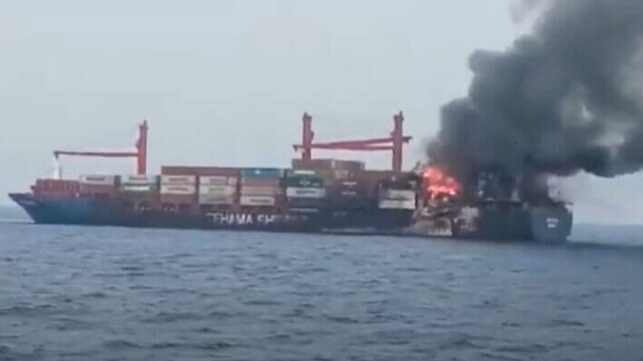Surge in Fire Safety Inspections Launches in Face of Increased Deficiencies

After a spate of high-profile vessel fires and a rise in fire safety-related deficiencies during vessel inspections, Port State inspectors will be launching a Concentrated Inspection Campaign focusing on fire safety and equipment aboard commercial vessels. The two leading associations for maritime administration, the Paris MoU and the Tokyo MoU, which oversee Port State Inspections, are launching the program on September 1, with individual states such as Panama already reporting the details of the program.
The Paris MoU in its 2022 annual report cited a dramatic increase in deficiencies and detentions registered during inspections. They highlighted that fire safety issues were the leading cause of detentions in 2022. Similarly, the U.S. Coast Guard, which is one of the leaders in inspections, also reported an increase in safety-related issues. They also said that fire safety led the categories of deficiencies citing issues ranging from oil waste, fuel leaks, oil in the bilge, and safety and fire equipment problems.
During regular ship inspections, they normally look at the functioning and maintenance of safety equipment. Inspectors check to make sure the equipment is functioning, the crew is trained, and that areas are well maintained. These elements will be increased during the three-month program which comes in addition to the normal inspection regimes.
“The purpose of this additional verification is to make sure the vessels and their crew are familiar with the requirements established in terms of the vessel fire safety and ISM, and its importance for the vessel’s safety operations verifying that the vessels comply with the applicable international instruments, and the proper implementation of the safety management system,” writes the Panama Maritime Authority.
Panama highlights that the Concentrated Inspections are a compliment to the safety inspection that is already taking place for vessels. They confirmed the additional focus is since the high levels of deficiencies were found in recent years in the area of fire safety and equipment.
Their 20-point questionnaire includes issues such as maintenance to ensure that emergency routes are in a safe condition. They also check the operation of key equipment as well as design issues for the safety equipment ensuring it meets international regulations. As with other inspections, they are also looking at the documentation and record keeping on the vessel.
Both of the MoUs will be analyzing the results of the three-month program looking at the issues of fire safety. They may use the findings to make recommendations to the IMO which could influence future fire safety regulations.
All of this comes as the industry continues to struggle with complex safety issues such as the shipment of electric, battery-powered cars in addition to the persistent issues of misidentified or poorly packed cargo. Insurer Allianz warned in its market analysis that the number of fires was increasing on ships. Over the past five years, Allianz reported 64 ships were total losses due to the fire.
The MoU’s goal is to increase awareness of fire safety among crews. At the same time, they want to increase the focus on the maintenance of safety equipment and training. The points on the concentrated fire safety questionnaire can contribute to deficiencies and like the primary inspection can also be used for detentions. A ship, however, will receive the concentrated inspection only once during the campaign.
